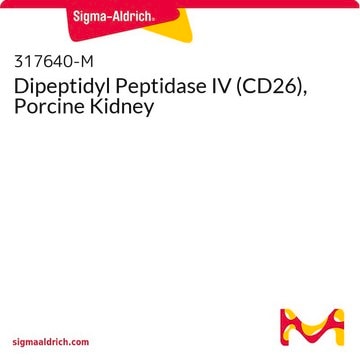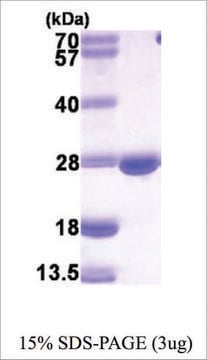37294
Dihydrofolate Reductase from bovine liver
~8 U/mL, ammonium sulfate suspension, off-white
Synonym(s):
Tetrahydrofolate Dehydrogenase
Sign Into View Organizational & Contract Pricing
All Photos(1)
About This Item
CAS Number:
MDL number:
UNSPSC Code:
12352204
NACRES:
NA.54
Recommended Products
biological source
bovine liver
Quality Level
form
ammonium sulfate suspension
specific activity
≥6 U/mg protein
concentration
~8 U/mL
color
off-white
density
1.2 g/mL at 20 °C
storage temp.
2-8°C
Application
Dihydrofolate reductase (DHFR) is involved in the synthesis of purines, thymidine and glycine in folate metabolism. DHFR, from bovine liver, is used for methotrexate analysis . DHFR is useful to study various cancers such as sarcomas, leukemias and head and neck cancers .
Biochem/physiol Actions
Dihydrofolate reductase (DHFR) reduces dihydrofolic acid to tetrahydrofolic acid, using NADPH as an electron donor. The binding of antitumor agents, such as methotrexate, to DHFR prevents the formation of reduced folates, which are essential for DNA synthesis .
Unit Definition
1 U corresponds to the amount of enzyme which converts 1 μmol 7,8-dihydrofolate and NADPH to 5,6,7,8-tetrahydrofolate and NADP per minute at pH 6.5 and 25 °C
Physical form
Suspension in 3.6 M ammonium sulfate solution, pH 7.0
Other Notes
In folate metabolism for the synthesis of purines, thymidine and glycine
Sales restrictions may apply
Storage Class Code
10 - Combustible liquids
WGK
WGK 3
Flash Point(F)
Not applicable
Flash Point(C)
Not applicable
Personal Protective Equipment
dust mask type N95 (US), Eyeshields, Gloves
Certificates of Analysis (COA)
Search for Certificates of Analysis (COA) by entering the products Lot/Batch Number. Lot and Batch Numbers can be found on a product’s label following the words ‘Lot’ or ‘Batch’.
Already Own This Product?
Find documentation for the products that you have recently purchased in the Document Library.
Use of dihydrofolate reductase from bovine liver, rather than from L. casei, for determining methotrexate.
R J Brooks
Clinical chemistry, 24(3), 518-519 (1978-03-01)
H B Eastman et al.
Proceedings of the National Academy of Sciences of the United States of America, 88(19), 8572-8576 (1991-10-01)
Dihydrofolate reductase (DHFR; EC 1.5.1.3) is required in folate metabolism for the synthesis of purines, thymidine, and glycine. Although there have been several reports of induction of DHFR enzyme by methotrexate (MTX), a drug that competitively inhibits DHFR, there are
Shimon Bershtein et al.
Molecular cell, 49(1), 133-144 (2012-12-12)
What are the molecular properties of proteins that fall on the radar of protein quality control (PQC)? Here we mutate the E. coli's gene encoding dihydrofolate reductase (DHFR) and replace it with bacterial orthologous genes to determine how components of PQC
Luca Freschi et al.
Molecular bioSystems, 9(1), 36-43 (2012-10-27)
One of the most important challenges in systems biology is to understand how cells respond to genetic and environmental perturbations. Here we show that the yeast DHFR-PCA, coupled with high-resolution growth profiling (DHFR-qPCA), is a straightforward assay to study the
Inbar Avraham et al.
Proceedings of the National Academy of Sciences of the United States of America, 109(52), E3678-E3686 (2012-12-01)
Plasmodium falciparum causes the deadliest form of human malaria. Its virulence is attributed to its ability to modify the infected RBC and to evade human immune attack through antigenic variation. Antigenic variation is achieved through tight regulation of antigenic switches
Our team of scientists has experience in all areas of research including Life Science, Material Science, Chemical Synthesis, Chromatography, Analytical and many others.
Contact Technical Service








